Executive Summary and Confidence Judgment
This report focuses on the role of Russia in the North Korean crisis. In the first part, it addresses the Russian-North Korean relations and their meaning for the regional theatre in light of Pyonyangâs nuclear threats; in the second section, it addresses the Sino-Russian relations and how the crisis is impacting them. It finally argues that the current North Korean crisis is likely to be exploited by Russia to expand its sphere of influence in the Far East. This work relies on expertsâ contributions, official reports and online media articles mainly published over the last 9 months, and whose reliability ranges from medium to high. Its limitation mainly lies in the lack of more accurate data and statistics on the North Korea economy, which are hardly available due to the secretive nature of the regime. Please refer to the table below for the WEP[1] and the overall confidence judgment.

Intelligence Cut-Off Date: September 24th, 2017
Key Judgments
Russia is likely to increase its influence in the Asian region as a result of the current crisis. Russia is unlikely to get militarily involved in the event of a conflict.Putin is likely to gain control of the Sino-Russian relations, diminishing the role of China in the partnership and rebalancing the asymmetry of the axis. China’s influence in the region is unlikely to decrease. It is likely the Russia and China will continue cooperating regardless of the contrasting geopolitical strategies, as both need each otherâs support to pursue their goals.Russia is likely to benefit from the North Korean crisis. Offering himself as mediator, Putin is likely to gain influence enough to leverage on other fronts in which Russia is involved â Middle East and Ukraine.
Russia and North Korea
Unlike the other actors involved, Russia pursues a diplomatic solution to the North Korean crisis.[2] While the US has responded to Pyonyangâs provocations with a frontal approach, threatening military intervention and imposing on partners the implementation of sanctions to isolate North Korea, Putin has invited all the parts to tone down the tensions, standing out as a mediator in the current crisis. The reasons why Moscow has offered itself as a moderator largely lie in the high stakes Russia faces in the event of conflict.
Over the last few years, Moscow has been normalising its relations with North Korea, developing a lively cooperation with Pyongyang. One of the most prominent shifts in relations was the measure undertaken by Russia in May 2014, only two months after the annexation of Crimea, when Putin signed away 90% of North Korea’s $11 million worth debt; the remaining 10% would have been utilised to fund joint projects. Later that year, while isolation built up around North Korea, Russia provided the country with humanitarian aid in form of 50,000 tons of wheat.[3] In addition, in a sign of goodwill, the parties signed a deal where North Korean workers stationed on the bordering territories are also monitored by the Russian authorities. Any possible defectors would be handed over to the North Korean authorities (unlike what happened in the Eltsin era, when several defectors were allowed to hide in the Russian territories).[4]
The nature of the challenge is largely geopolitical. The cooperation between the two powers had already been strengthened a few months before, when Moscow and Pyongyang established a crucial commercial route linking Vladivostock with Rason.[5] On a commercial level, the ferry route of course involves the trade in wheat and tourism, being able to carry up to 200 people and 1000 tons six times a month.[6] On a geopolitical level, however, it gains a strategic importance regarding regional security. Positive relations with North Korea means that Russia is likely secure the bordering territories from Pyonyangâs nuclear missiles range. Although Russia has reiterated that the nuclear tests are not a concern â not even the one that, last March, led a North Korean missile to fall about 500 km from Russian territory[7]. Moscow prefers to keep relations with North Korea as peaceful as possible, due to the unpredictable nature of Pyonyang. COMMENT: The opening of the ferry traffic between the two ports should not be underestimated, as it likely represents one of the pillars of the Russian-NK relations and a delicate lynchpin for the endurance of the regional security. COMMENT ENDS.
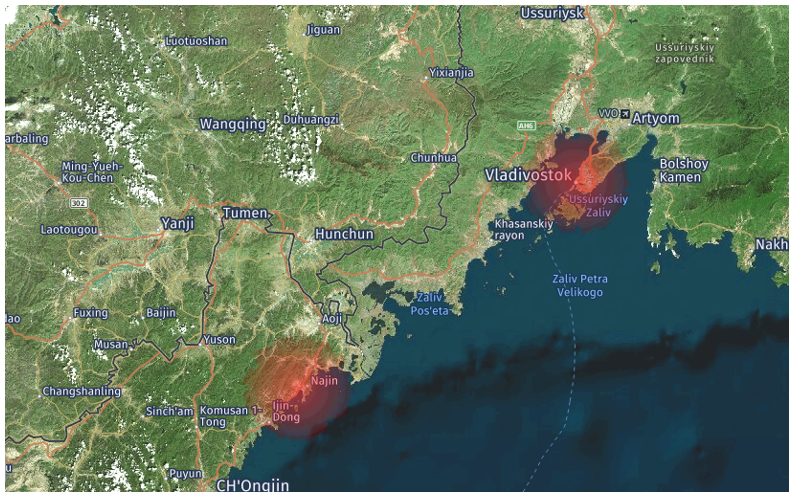
The ports of Vladivostock (north) and Rason (south), recently linked by the establishment of a commercial route
On a broader level, the surfacing of North Korea as a hostile actor has reshuffled the strategy. North Korea is seen as a âdisturbance factorâ for regional security and the Asian strategic theatre, as its threatening foreign politics provided the US with a substantial pretext to strengthen its military presence in the Pacific area and deploy military capabilities in South Korea.[8] Both Russia and China have been concerned by Pyonyangâs turmoil and the consequent US military strengthening in South Korea. However, while China has substantially (although not convincingly enough) aligned with the sanctions and UN sanctions and measures, Russia has tried to exploit the North Korean anti-Western position to leverage on the balance of power. The US military and anti-nuclear system build up (also known as THAAD, Terminal High-Altitude Area Defense system) in South Korea particularly alarmed Moscow, raising concerns over the disproportionate balance of power in the region and triggering in turn a counter military build-up to compensate the defence capabilities.[9]
Moscow has also tried to rebalance the US military presence by diplomatically approaching South Korea. Russia has not manifested peremptory criticism on South Korea as âhostâ of the US deployment, but rather it has attempted to include Seoul and convince the Prime Minister Moon Jae-in to take part in trilateral negotiations.[10] : Although these attempts, anticipated by previous talks between Alexander Matsegora, Russian Ambassador to Pyonyang, and Han Song Ryol, North Korean Deputy Foreign Minister[11], are unlikely to lead to the expected results, they have enabled Putin to impose himself as an (unofficial) full-fledged mediator of the crisis, giving him enough leverage to establish himself as a crucial actor, without whom it appears hard today to solve the potential conflict.
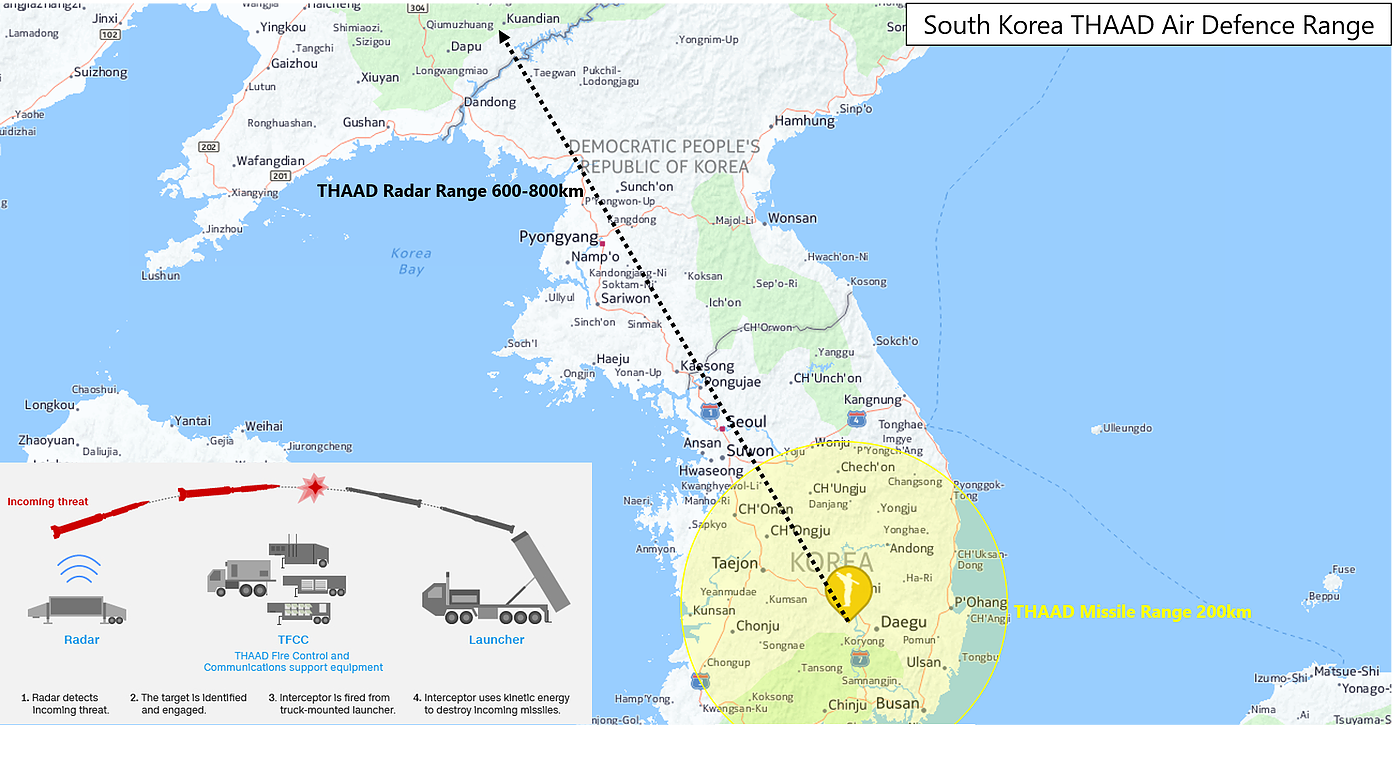
(Click on above image to expand)
It should be mentioned that Russia does not have many other options than pursuing a diplomatic solution to the ongoing crisis. On a military level, the reasons why Russia is unlikely to get involved in a conflict are disparate and diverse (ideological affinity; economic, commercial and strategic interests); however, were the strategy to change and Putin to consider at some point a military involvement, it would be hard for him to deploy the necessary military capabilities, since the ongoing commitment in Ukraine and Middle East prevent him from diverting the required forces. On an economic level, the economic partnership is far more fragile than it seems, as it is not solid enough to be used as leverage on Pyonyang. According to 2015 estimates, while Chinese trade represents the 85% (roughly $2.95 bil) of the total North Korean import, Pyonyang imports from Russia just 2.3% (roughly $78.2 mil), of which mainly coal briquettes (57%), petroleum (24%) and wheat (3.4%).[12] Russian export to North Korea approximately totals $80 million â an insufficient amount to exercise an effective economic pressure. In addition, the UN sanctions have caused a $550 million worth revenue loss for North Korea, which amounts to 92 times the size of the North Korean export to Russia, and yet this has not prevented Pyonyang from pursuing the nuclear tests.[13]
This data being considered, however, Russia largely benefits from such a strategy. The economic partnership with North Korea mitigates the impact of the UN sanctions and supports North Korea as an anti-Western actor. In doing so, Putin achieves multiple objectives: backing Pyonyang as counterpart of the US and its newly-gained influence in the region; ostensibly securing commercial routes and bordering territories from the potential peril of a nuclear conflict; standing out as the actor who worked the most towards a peaceful ending, by offering himself to direct the negotiations and reaching a diplomatic solution; becoming an unneglectable figure for the resolution of the crisis. However, the proactive role of mediator undertaken by Putin also helps Russia to rebalance another asymmetric relation: the one with China.
The Sino-Russian Relations in the North Korean crisis
Fairly more compromised than Russia from the ongoing turmoil, China plays an important role in the North Korean crisis. The relations between the two major powers has been reshaped over the last few years, and the current crisis in the Korean peninsula has been a game-changer under many aspects. Multiple times Russia complained that Beijing benefitted a lot more from the Sino-Russian axis than Moscow did, and since the privileged relation between China and North Korea has deteriorated, Putin has tried to exploit the situation and get closer to Pyonyang, to gain influence in the Far East and rebalance the partnership with Beijing.
It was when China aligned with the UN that the cooperation between Moscow and Pyonyang was strengthened. As China showed the first harbingers of abandoning the historical partnership with North Korea, the regimeâs media accused Beijing of âoutright betrayal.â[14] In the same week, the aforementioned route linking Vladivostok and Rason was established â but it was not the only project. Earlier this year, Moscowâs executives of the state-controlled company âRussian Railwaysâ went to North Korea to offer and enhance cooperation regarding the development of the railroad infrastructure, including a railway road projects linking Rason with Khasan and facilitating North Korean students to reach Russian universities.[15] Two months later, a deal between Russian and North Korean officials expanded the peninsulaâs labor immigration to Russia (mainly forced workers, according to human rights organisations). It was the same time frame (February 2017) in which China had cut off North Korean coal imports, and Russia had offered to replace the loss.[16] COMMENT: Russia is likely to effectively take advantage of the decline of the Sino-North Korean relations, strengthening the partnership with Pyonyang and continuing working with Beijing to contain the expanding sphere of influence of the US in the region. COMMENT ENDS.
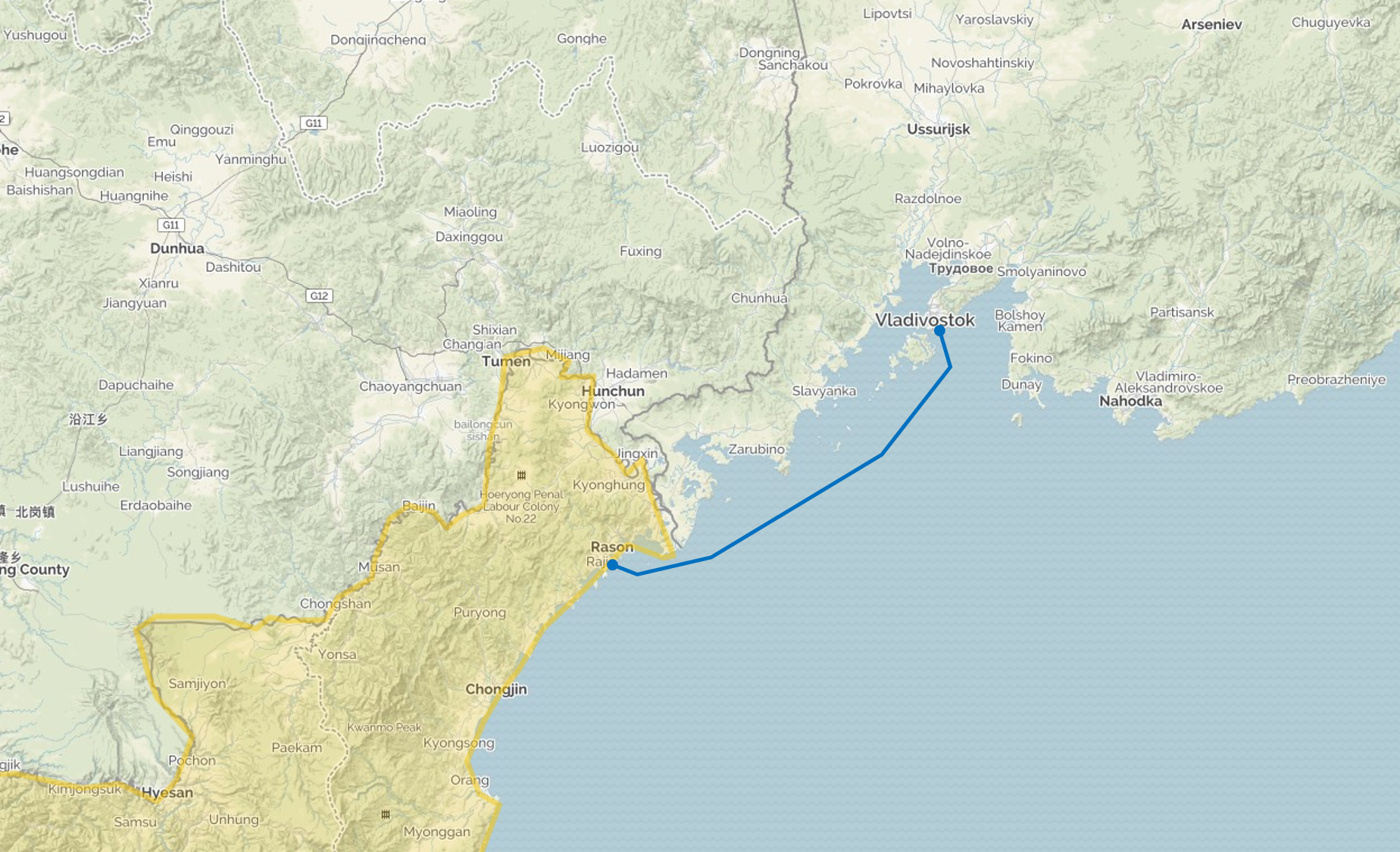

A ferry service opens between North Korea and Russia. (Click above image to expand)
The degree to which China is actually complying with the UN sanctions is not easily assessed. As mentioned before, China has cut North Korean coal import by 75%, but according to government officials, over the first half of 2017 the trade with Pyonyang was worth approximately $2.6 billion â a 10% increase compared to the previous yearâs first semester.[17] In fact, the cut of coal import did not lead to a cut of the overall commercial relations, which have grown by 30% as for export to North Korea.[18] Such connection has helped Pyonyang dodge UN sanctions by ensuring solid earnings ($270 million from illegal import) and granting tax breaks to North Koreans, who are allegedly used to register their companies in Hong Kong and use Chinese banks for international transactions.[19]
Beijingâs uncertain commitment against Pyonyang is likely to have weakened Chinaâs position since the beginning of the crisis. On one side, Chinaâs recent export cuts to North Korea, which mainly restrained the petroleum trade, a crucial source of support for Pyonyang, suggests Beijing is ready to move substantial steps forward.[20] On the other, its ambiguity over these months has been conveniently called into question by the US, which has severed ties between American and Chinese banks to exercise a stronger economic pressure on China.[21] China has justified its prolonged trade with Pyonyang by claiming that it was not in violation with the scope of the sanctions and that UN measures are not to be considered an embargo also embracing primary and humanitarian goods for the North Korean people.[22] COMMENT: As North Koreaâs major commercial partner, accounting for 80% of its foreign trade[23], China is concerned that severing commercial ties with Pyonyang is likely to exacerbate North Koreaâs irritation and further endanger the regional security. Chinaâs ambiguity is further explained by the concern that a regime collapse is likely to pose the risk of massive refugee flows in a hypothetical post-Kim era, other than expanding US influence in the region. COMMENT ENDS.
The North Korean crisis â with North Korea as a âdisturbance factorâ â is reshaping the balance of power of the Sino-Russian relations. Both the countries have numerous common interests, mainly comprising: the counterbalance of the US and its enlarged military influence in the Asian region; the aversion to its human rights campaign; further enhancing military cooperation and trade and creating an axis that allows them to support each otherâs influence â Putin pushing towards Europe (Ukraine) and the Middle East, China consolidating its presence and control on Asia. China also has a strong interest in getting access to Russian supplies, investments, advanced military technology and energy cooperation.[24] From the Russian perspective, the partnership is even more beneficial. Moscow, in fact, in as much as sharing defence system worth hundreds of millions of dollars and comprising aircrafts such as Su-35 and S-400 [25], is less dependent on the partner. COMMENT: Sharing advanced military technology has likely meant for the Chinese to implicitly recognise the Russian superiority in defence systems, allowing Putin to gain a heavier influence in the Asian strategic theatre and rebalance the asymmetric equilibrium he had complained until few years ago, when the relations with China were already stable. However, it is also likely that Putin needs such purchases from the Chinese to financially pursue its military operations. COMMENT ENDS.
However, the status of such relations has not been without frictions. The most evident development is the different paths embarked upon by the two powers regarding the current crisis, with Russia intensifying its cooperation with Pyonyang, and China aligning with the UN (but still not convincingly enough). Other frictions previously involved: Russian complaints over unfair negotiations conducted by Chinese counterparts; difficulties in concretely realising infrastructures such as the $400 billion worth “Power of Siberia” gas pipeline and the Altai-pipeline[26]; concerns that sharing Russian military technology â $8 billion worth purchase, overall[27] â could pose the risk of reverse engineering from China.[28] Still, as emphasised by Russian Defense Minister Anatoly Antonov[29], the military cooperation is a reality, and has recently resulted in joint exercises (see the ones that took place in the Baltic Sea), reinforcing the partnership also on a defence level. Both the partners have, in fact, sent the same message to a wide range of recipients, US above all â i.e. showing the world that both have a strong ally to rely on, so that security partners are reassured and adversaries deterred. COMMENT: It is likely that such a cooperation will continue intensifying regardless of the contrasting goals of the two partners. On one side, Russia will likely exploit the Chinese uncertainties over the North Korean crisis to strengthen its position as mediator and getting even closer to Pyonyang, so that it will be able to expand its influence in Asia to the detriment of Beijing and supporting North Korea as a âbuffer stateâ opposing the US influence. On the other, China is likely to weaken itself due to the uncertain and contrasting attitudes towards the crisis, but unlikely to lose control on the region, as its political ties and economic leverage remain a powerful asset; moreover, it is a realistic probability that it will manage to counterbalance the influence gained by Putin by leveraging on Moscowâs concerns over military technology reverse engineering. COMMENT ENDS.
Assessment
Based on the evidence and the ACH matrix provided below, we assess:
Russia is likely to exploit the North Korean crisis to expand its influence in the region.Russiaâs proactive role as mediator and diplomatic commitment towards a peaceful resolution of the crisis suggests Moscow is unlikely to military intervene in the event of conflict.
Putin is highly likely to benefit from such an impartial position in terms of:
counterbalancing the US influence by supporting North Korea as âbuffer stateâ, with which Moscow has established a progressively stronger economic, commercial and political partnership;securing Russiaâs neighbouring territories in case of conflict;rebalancing the role of Russia in the Sino-Russian relations;leveraging on such role of peacekeeper to obtain wider freedom for the military operations in other open fronts in which Russia is involved, such as Ukraine and Middle East.
Due to the fluctuating and uncertain commitment towards complying with the UN sanctions and isolating Pyonyang, China has exposed itself and weakened its position.It is a realistic probability that the impact of the North Korean crisi will decrease Chinaâs role in the Sino-Russian relations, but Beijing is unlikely to lose control and influence in the region.It is likely that the Sino-Russian cooperation will continue regardless of the contrasting goals of the two partners.
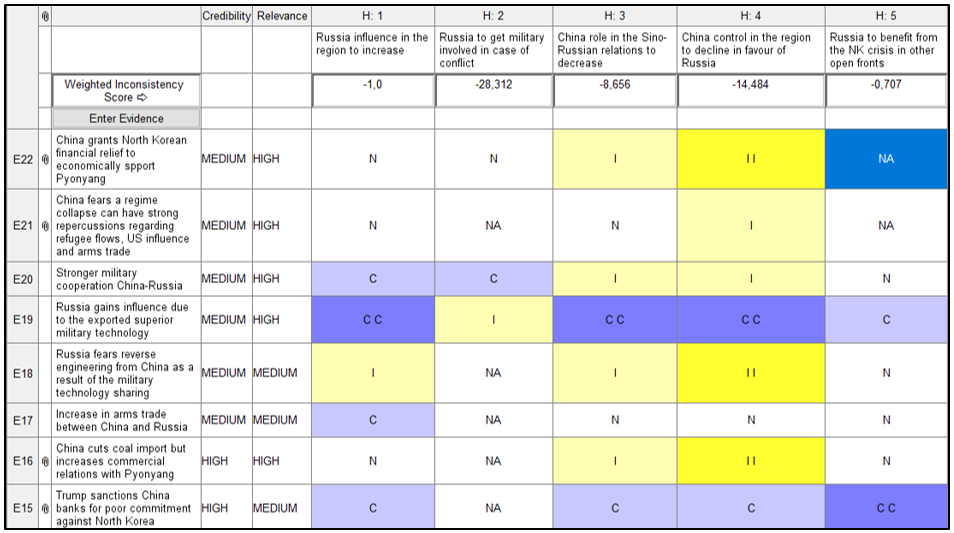
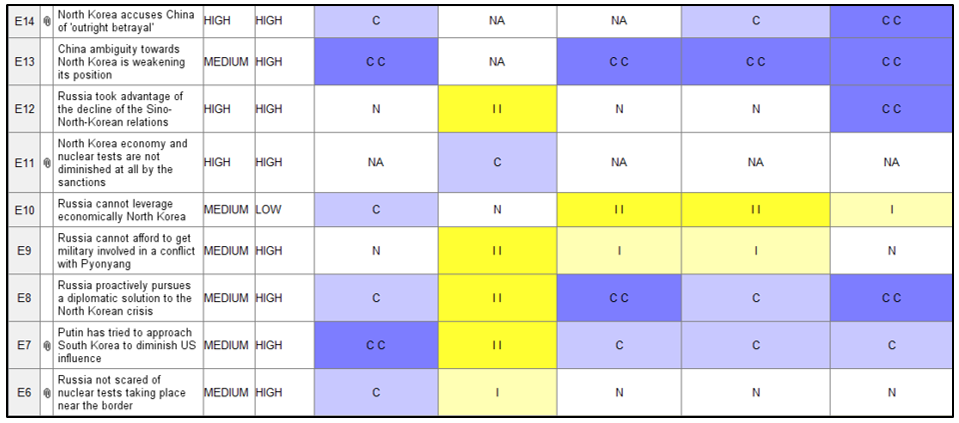

(Click on above images to expand)
Sources
Author Unknown, âChina to suspend all imports of coal from North Koreaâ, CNBC, https://www.cnbc.com/2017/02/19/china-to-suspend-all-imports-of-coal-from-north-korea.html
Author Unknown, âChina: U.S. Threatens Banks Over North Korean Tiesâ, Stratfor, https://worldview.stratfor.com/article/china-us-threatens-banks-over-north-korean-ties.
Author Unknown, âChina warned N.Korea of sanctions after any nuclear test: Tillersonâ, CNBC, https://www.cnbc.com/2017/04/27/china-warned-n-korea-of-sanctions-after-any-nuclear-test-tillerson.html.
Author Unknown, âExpanding Military Ties with China Priority for RussiaâDefense Ministry,â TASS, http://tass.ru/en/politics/880015.
Author Unknown,â ÐинобоÑÐ¾Ð½Ñ Ð Ð¤: баллиÑÑиÑеÑÐºÐ°Ñ ÑакеÑа ÐÐÐÐ Ñпала в 500 км Ð¾Ñ Ð Ð¾ÑÑииâ, ТÐСС, http://tass.ru/armiya-i-opk/4250467.
Author Unknown, âNorth Koreaâs senior diplomat holds talks with Russiaâs ambassadorâ, TASS, http://tass.com/world/944038.
Auhtor Unknown, âÐоÑÑÑÐµÐ»Ñ Ð·Ð°ÐºÐ°Ð·Ð¾Ð² ÐиÑÐ°Ñ Ð½Ð° ÑоÑÑийÑкое вооÑÑжение пÑевÑÑил $8 млÑдâ, Interfax, http://www.interfax.ru/russia/535092.
Author Unknown, âPutin says willing to send emissary to N. Korea for mediation: Moon’s envoyâ, TASS, http://www.koreaherald.com/view.php?ud=20170525000255.
OEC â North Korea, http://atlas.media.mit.edu/en/profile/country/prk/
Bodne, Matthew, âIn Arms Trade, China Is Taking Advantage of Russia’s Desperationâ, The Moscow Times, https://themoscowtimes.com/articles/in-arms-trade-china-is-taking-advantage-of-russian-desperation-55965.
Borak, Donna & Diamond, Jeremy, âTrump sanctions Chinese bank in bid to rein in North Koreaâ, CNN, http://money.cnn.com/2017/06/29/news/economy/trump-sanctions-china-north-korea/?iid=EL.
Chandran, Nyshka, âAs China-North Korea ties cool, Russia looks to benefitâ, CNBC, https://www.cnbc.com/2017/05/07/as-china-north-korea-ties-cool-russia-looks-to-benefit.html.
Chase, Michael S., Medeiros, Evan S., Roy, J. Stapleton, Rumer, Eugene B., Sutter, Robert and Weitz, Richard, âRussia-China Relations. Assessing Common Ground and Strategic Fault Linesâ, The National Bureau of Asian Research, http://nbr.org/publications/specialreport/pdf/free/09152017/SR66_Russia-ChinaRelations_July2017.pdf.
Chin, Josh, âChina to Cut Oil Exports to North Koreaâ, Wall Street Journal, https://www.wsj.com/articles/china-to-limit-oil-supply-to-north-korea-1506140701.
Clover, Charles, âRussia and China Learn from Each Other as Military Ties Deepen,â Financial Times, http://www.ft.com/cms/s/0/a3e35348-2962-11e6-8b18-91555f2f4fde.html#axzz4Ckj1hDbn.
Daniel, Jeff, âChina gets rare rebuke from North Korea for ‘betrayal’â, CNBC, https://www.cnbc.com/2017/05/03/china-gets-rare-rebuke-from-north-korea-for-betrayal.html.
Dominiguez, Gabriel, âWhy Russia needs China to buy its weaponsâ, DW, http://www.dw.com/en/why-russia-needs-china-to-buy-its-weapons/a-18870472.
Iyengar, Rishi, âChina is trading more with North Korea but buying much less coalâ, CNN, http://money.cnn.com/2017/07/13/news/economy/china-north-korea-trade-data-us-trump/index.html.
Kuo, Mercy A., âGeopolitics of US-China-Russia Relations: North Korea and the Middle Eastâ, The Diplomat,
http://thediplomat.com/2017/05/geopolitics-of-us-china-russia-relations-north-korea-and-the-middle-east/.
Lee, Jiyeun, âNorth Korea’s Economy Is Growing at Its Fastest Pace Since 1999â, Bloomberg, https://www.bloomberg.com/news/articles/2017-07-21/north-korea-s-economy-rebounds-from-drought-amid-missile-focus.
Leonid Bershidsky, âThe Key to North Korea Is Russiaâ, Bloomberg, https://www.bloomberg.com/view/articles/2017-05-18/the-key-to-north-korea-is-russia.
Luhn, Alec, âFerry service opens between North Korea and Russiaâ, The Guardian, https://www.theguardian.com/world/2017/may/18/ferry-service-between-north-korea-russia-starts-weekly-service.
Mullen, Jethro, âHow North Korea makes its money: Coal, forced labor and hackingâ, CNN, http://money.cnn.com/2017/04/05/news/economy/north-korea-economy-china-trump-xi/?iid=EL.
Pinchuk Denis & Osborn, Andrew, âPutin says U.S. missile systems in Alaska, South Korea challenge Russiaâ, Reuters, http://www.reuters.com/article/us-russia-economic-forum-putin/putin-says-u-s-missile-systems-in-alaska-south-
korea-challenge-russia-idUSKBN18S4NS.
Schuman, Michael, âPyongyangâs China Connectionâ, US News https://www.usnews.com/news/best-countries/articles/2017-09-19/how-china-keeps-north-koreas-economy-afloat.
Shim, Elizabeth, âNorth Korea ferry to resume service to Russiaâ, UPI, http://www.upi.com/Top_News/World-News/2017/04/19/North-Korea-ferry-to-resume-service-to-Russia/6861492625623/.
[1] Words of Estimative Probability.
[2] Author Unknown, âNorth Koreaâs senior diplomat holds talks with Russiaâs ambassadorâ, TASS, http://tass.com/world/944038. See also: Author Unknown, âPutin says willing to send emissary to N. Korea for mediation: Moon’s envoyâ, TASS, http://www.koreaherald.com/view.php?ud=20170525000255.
[3] Leonid Bershidsky, âThe Key to North Korea Is Russiaâ, Bloomberg, https://www.bloomberg.com/view/articles/2017-05-18/the-key-to-north-korea-is-russia.
[4] Ibidem.
[5] Luhn, Alec, âFerry service opens between North Korea and Russiaâ, The Guardian, https://www.theguardian.com/world/2017/may/18/ferry-service-between-north-korea-russia-starts-weekly-service.
[6] Shim, Elizabeth, âNorth Korea ferry to resume service to Russiaâ, UPI, http://www.upi.com/Top_News/World-News/2017/04/19/North-Korea-ferry-to-resume-service-to-Russia/6861492625623/. See also: Chandran, Nyshka, âAs China-North Korea ties cool, Russia looks to benefitâ, CNBC, https://www.cnbc.com/2017/05/07/as-china-north-korea-ties-cool-russia-looks-to-benefit.html.
[7] Author Unknown,â ÐинобоÑÐ¾Ð½Ñ Ð Ð¤: баллиÑÑиÑеÑÐºÐ°Ñ ÑакеÑа ÐÐÐÐ Ñпала в 500 км Ð¾Ñ Ð Ð¾ÑÑииâ, ТÐСС, http://tass.ru/armiya-i-opk/4250467.
[8] Kuo, Mercy A., âGeopolitics of US-China-Russia Relations: North Korea and the Middle Eastâ, The Diplomat, http://thediplomat.com/2017/05/geopolitics-of-us-china-russia-relations-north-korea-and-the-middle-east/.
[9] Pinchuk Denis & Osborn, Andrew, âPutin says U.S. missile systems in Alaska, South Korea challenge Russiaâ, Reuters, http://www.reuters.com/article/us-russia-economic-forum-putin/putin-says-u-s-missile-systems-in-alaska-south-korea-challenge-russia-idUSKBN18S4NS.
[10] Author Unknown, âPutin says willing to send emissary to N. Korea for mediation: Moon’s envoyâ, TASS, http://www.koreaherald.com/view.php?ud=20170525000255.
[11] Author Unknown, âNorth Koreaâs senior diplomat holds talks with Russiaâs ambassadorâ, TASS, http://tass.com/world/944038.
[12] OEC â North Korea, http://atlas.media.mit.edu/en/profile/country/prk/. See also: Lee, Jiyeun, âNorth Korea’s Economy Is Growing at Its Fastest Pace Since 1999â, Bloomberg, https://www.bloomberg.com/news/articles/2017-07-21/north-korea-s-economy-rebounds-from-drought-amid-missile-focus.
[13] Snyder, Xander, âWhy Russia Canât End the North Korea Crisisâ, Geopolitical Futures¸ https://geopoliticalfutures.com/why-russia-cant-end-the-north-korea-crisis/.
[14] Daniel, Jeff, âChina gets rare rebuke from North Korea for ‘betrayal’â, CNBC, https://www.cnbc.com/2017/05/03/china-gets-rare-rebuke-from-north-korea-for-betrayal.html.
[15] Chandran, Nyshka, âAs China-North Korea ties cool, Russia looks to benefitâ, CNBC, https://www.cnbc.com/2017/05/07/as-china-north-korea-ties-cool-russia-looks-to-benefit.html.
[16] Author Unknown, âChina to suspend all imports of coal from North Koreaâ, CNBC, https://www.cnbc.com/2017/02/19/china-to-suspend-all-imports-of-coal-from-north-korea.html. See also: Author Unknown, âChina warned N.Korea of sanctions after any nuclear test: Tillersonâ, CNBC, https://www.cnbc.com/2017/04/27/china-warned-n-korea-of-sanctions-after-any-nuclear-test-tillerson.html.
[17] Iyengar, Rishi, âChina is trading more with North Korea but buying much less coalâ, CNN, http://money.cnn.com/2017/07/13/news/economy/china-north-korea-trade-data-us-trump/index.html.
[18] Schuman, Michael, âPyongyangâs China Connectionâ, US News https://www.usnews.com/news/best-countries/articles/2017-09-19/how-china-keeps-north-koreas-economy-afloat.
[19] Iyengar, Rishi, âChina is trading more with North Korea but buying much less coalâ, CNN, http://money.cnn.com/2017/07/13/news/economy/china-north-korea-trade-data-us-trump/index.html.
[20] Chin, Josh, âChina to Cut Oil Exports to North Koreaâ, Wall Street Journal, https://www.wsj.com/articles/china-to-limit-oil-supply-to-north-korea-1506140701.
[21] Author Unknown, âChina: U.S. Threatens Banks Over North Korean Tiesâ, Stratfor, https://worldview.stratfor.com/article/china-us-threatens-banks-over-north-korean-ties. See also: Borak, Donna & Diamond, Jeremy, âTrump sanctions Chinese bank in bid to rein in North Koreaâ, CNN, http://money.cnn.com/2017/06/29/news/economy/trump-sanctions-china-north-korea/?iid=EL.
[22] Ibidem
[23] Mullen, Jethro, âHow North Korea makes its money: Coal, forced labor and hackingâ, CNN, http://money.cnn.com/2017/04/05/news/economy/north-korea-economy-china-trump-xi/?iid=EL.
[24] Chase, Michael S., Medeiros, Evan S., Roy, J. Stapleton, Rumer, Eugene B., Sutter, Robert and Weitz, Richard, âRussia-China Relations. Assessing Common Ground and Strategic Fault Linesâ, The National Bureau of Asian Research, http://nbr.org/publications/specialreport/pdf/free/09152017/SR66_Russia-ChinaRelations_July2017.pdf.
[25] Bodne, Matthew, âIn Arms Trade, China Is Taking Advantage of Russia’s Desperationâ, The Moscow Times, https://themoscowtimes.com/articles/in-arms-trade-china-is-taking-advantage-of-russian-desperation-55965.
[26] Dominiguez, Gabriel, âWhy Russia needs China to buy its weaponsâ, DW, http://www.dw.com/en/why-russia-needs-china-to-buy-its-weapons/a-18870472.
[27] Auhtor Unknown, âÐоÑÑÑÐµÐ»Ñ Ð·Ð°ÐºÐ°Ð·Ð¾Ð² ÐиÑÐ°Ñ Ð½Ð° ÑоÑÑийÑкое вооÑÑжение пÑевÑÑил $8 млÑдâ, Interfax, http://www.interfax.ru/russia/535092.
[28] Bodne, Matthew, âIn Arms Trade, China Is Taking Advantage of Russia’s Desperationâ. See also: Clover, Charles, âRussia and China Learn from Each Other as Military Ties Deepen,â Financial Times, http://www.ft.com/cms/s/0/a3e35348-2962-11e6-8b18-91555f2f4fde.html#axzz4Ckj1hDbn.
[29] Author Unknown, âExpanding Military Ties with China Priority for RussiaâDefense Ministry,â TASS, http://tass.ru/en/politics/880015.











